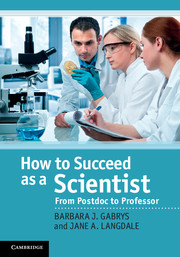Book contents
- Frontmatter
- Contents
- Preface
- Acknowledgements
- Part I Becoming an independent researcher
- Part II Thriving in your new job
- 10 Handling new roles
- 11 Learning from other people
- 12 Managing people
- 13 Building a research group I
- 14 Building a research group II
- 15 Interacting with others
- 16 Designing a taught course
- 17 Giving a good lecture
- 18 Beyond lecturing
- 19 Mentoring
- Part III Managing your career
- Index
15 - Interacting with others
from Part II - Thriving in your new job
Published online by Cambridge University Press: 05 November 2011
- Frontmatter
- Contents
- Preface
- Acknowledgements
- Part I Becoming an independent researcher
- Part II Thriving in your new job
- 10 Handling new roles
- 11 Learning from other people
- 12 Managing people
- 13 Building a research group I
- 14 Building a research group II
- 15 Interacting with others
- 16 Designing a taught course
- 17 Giving a good lecture
- 18 Beyond lecturing
- 19 Mentoring
- Part III Managing your career
- Index
Summary
Over the course of your career, your science will be enhanced through interactions with others, both in your own field and beyond. Our accomplishments are noticed and appreciated by others, but we also need to notice and appreciate the achievements of others. In academia such interdependence is seen in networking, collaborations and in ‘community service’. In this chapter we explore the benefits and costs of these three endeavours.
The theory
Covey’s philosophy for success (see Chapter 1) is focused on developing seven ‘habits’, of which three relate to how we deal with others. Since we act upon, and are acted on, by the world around us, it is essential to identify the limits of our influence. In this context there is a Circle of Concern that comprises events and actions that we have no real influence over, but which still affect us, and a Circle of Influence that comprises events and actions that we have some control over (Covey et al., 1994). The art is to focus our efforts on the latter (note that proactive people ensure that the circle of concern is encompassed by the circle of influence).
Covey’s main audience is managers and industrialists – can scientists, and in particular academics, benefit in any way from his philosophy? One of the main aims of science is the production of knowledge (Ziman, 2000) and on this premise many similarities can be found. For example, scientists are promoted on the basis of the quality and number of papers published (output), the total amount of grant funding awarded (resources necessary for production) and on their national and international reputation (brand name). More importantly, the success of Covey’s philosophy is in large part due to a combination of ethical principles, self-development and action in the real world. In his approach ‘fundamental principles’ such as fairness, integrity and honesty form the cornerstone of behaviour (Covey, 2004). It may be no coincidence that each of these principles is central to the scientific process.
Information
- Type
- Chapter
- Information
- How to Succeed as a ScientistFrom Postdoc to Professor, pp. 136 - 144Publisher: Cambridge University PressPrint publication year: 2011
